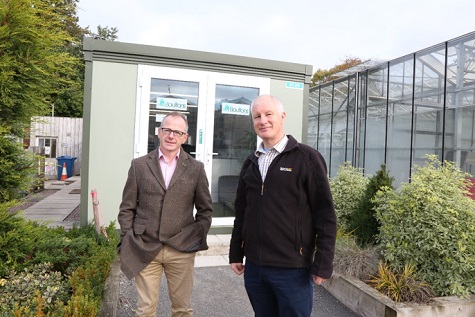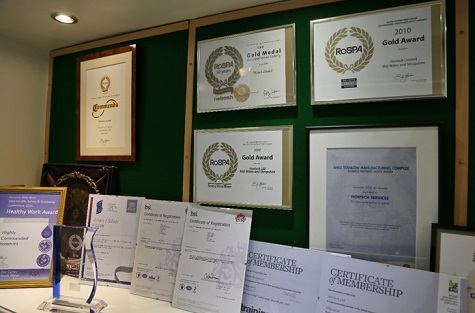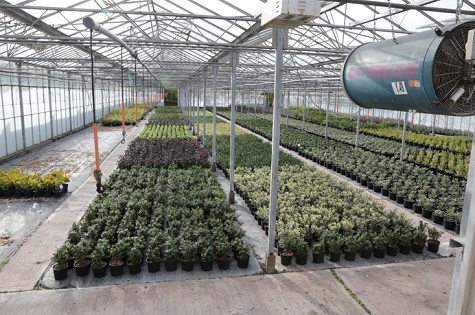LAURENCE GALE: During my recent attendance at this year’s Amenity Forum Conference I was intrigued by commercial director for Hortech Ltd, Duncan Jones’ presentation. His talk provoked a lot of issues we need to address to ensure that we as industry professionals can continue to deliver effective weed control services for the amenity sector.
His words rang true regarding the current state of our industry and the issues we will face with the potential loss of further active ingredients for the control of pest weeds and diseases.
Duncan’s presentation was as follows: -

Duncan Jones
“Why do we do the right thing? Why join the Amenity Forum or maintain Amenity Assured status?
Why invest in staff training or try and maintain professional standards? Why employ BASIS advisors or even have staff with PA1 or PA2 qualifications? What benefit is there, in playing by the rules if the rules are not enforced or don’t carry any weight during either the procurement process or contract term. Is it only about the price? Why bother when many large national grounds and facility companies aren’t members of the Amenity Forum or have Amenity Assured status? Am I being a little negative or overly dramatic? Well, I don’t think so.
My evidence, based on contracts Hortech have tendered for over the last 18 months, suggests that clients are becoming less concerned in professional standards, certainly at pre-qualification stage. Over the last 18 months not one tender we have priced has made any reference to minimum professional standards with regard to herbicide application, not one. And that includes FM companies, utility, industrial, local authority and members of the Amenity Forum. The procurement departments of our clients whether utility, facilities management, local authority or industrial seem oblivious to BASIS, Amenity Forum or legal requirements. If that is OK then fair enough. If the Amenity Forum is just for an internal audience so be it. If Amenity Assured is just a feel-good project that we keep to ourselves, then OK.
But here is the contradiction, the shifting sands of public opinion. The growth in stakeholder scrutiny. The social media outcry when someone is seen applying herbicide with or without PPE. The application of herbicides in the amenity environment, whether public spaces or closed industrial sites become more controversial and problematic by the week. ‘Roundup causes cancer’, ‘Monsanto / Bayer are lying to us’, etc. Only last week the headline on the front page of the Shrewsbury Chronical was ‘Weed killer caused my cancer’, a story relating to a former local authority groundsman who had applied 24D to treat sports turf weeds. Now, most will not get past the headline ‘Weed killer caused my cancer’ and will form an opinion based on the headline. Yet the procurers of weed control services, as a single service or as part of a wider suite of services chose not to or don’t know how to quality check potential suppliers. Now I do know that some of you will be able to quote contracts and clients where Amenity Assured and Amenity Forum credentials count for something and that is great, but that is very much the exception rather than the rule.
The voice of the naysayers is getting louder and louder and more and more are joining the debate. A debate fuelled in part by social media, national press and law suits from over the pond.
The call for alternatives to herbicides is growing from clients and stakeholders from acetic acid to hot water systems, flames and electricity. All have their place and we clearly must embrace new technology and reduce herbicide use in order to protect the herbicides we have. However, this is difficult when the primary award factor is cost. Alternatives to herbicide are expensive and we operate in a very cost driven sector often at the wrong end of an extended supply chain.
So, what’s at stake if we continue to procure herbicide services this way? The loss of glyphosate, not through scientific evidence or debate, but through the general public losing confidence in the product and us? Our credibility? Our industry? Is it now counterproductive to have the term ‘weed control’ in your company name or marketing material? I can see some in the room thinking Duncan for goodness sake don’t be so negative. It’s not that bad. And to be fair I am by nature an optimist, a man who does not think of a glass as half full or half empty but as refillable. However, it’s not about being positive or negative it’s about being realistic and affecting change.
And where is the opportunity which I talk about?
So, to the opportunity. This is our industry and let’s face it, there must be easier ways to earn a living, so we must be doing what we do because we believe in what we are doing. I do fear for the future of the weed control sector. I fear that our voice is getting lost amongst the noise, I fear that we are becoming irrelevant.
Our opportunity is to set the agenda, lead the debate and change narrative; it starts with The Amenity Forum and BASIS. The Amenity Forum is a strong platform on which we can and should build our industry. John and his team do a super job in promoting and arguing our case and there has been increased visibility within the industry over the last few years. But, this message is not currently getting to procurement teams.
We have always played nicely, been polite, waited our turn but, I am not sure this is now the best approach.
We need to educate current clients and potential clients, the influencers, our peer group, the educators, the students and the general public about best practice, stewardship, about the importance of using amenity assured contractors, integrated weed control programmes and awarding contracts based on their true value rather than just their monetary value.
First and foremost, we need to persuade our colleagues that our industry is relevant and that the Amenity Forum is the best vehicle to speak truth to power, regarding our values and standards within weed control.
The Amenity Forum currently has 60 members only 22 of which are weed control contractors, the big herbicide users, the biggest national players and influencers are not members. I don’t know why? The Amenity Forum is a credible and well lead organisation, why wouldn’t you want to be part of it? It’s not even expensive or difficult to join. We need to persuade them that we are relevant and stronger together. Some of the largest users of amenity herbicides in the UK including companies like Sodexo, MITIE, Serco, Idverde, Nurture and Ground Control must be encouraged and supported to join us. These companies are good respectable businesses with influence and there are of course many more who should be encouraged to join. In fact, anyone who commercially applies amenity herbicides should join the forum. With increased membership comes increased influence, relevance and opportunity to inform the debate. Compare this with BALI who currently has 906 members across all categories, 543 involved in contracting of which 499 can potentially deliver weed control services to a great or lesser extent.
With a membership of 60 we are just too small. Much greater opportunity and change will come when we speak for a significant portion of the industry and that means a membership northward of 150.
Furthermore, based on the latest information I could find there are 81 companies who are Amenity Assured, sounds like a reasonable number! Not so… 40 of the companies are Complete Weed Control franchises. It is fantastic that Complete Weed Control are leading the way, setting the example and standard, but 41 is a somewhat less impressive number. Why don’t other amenity herbicide users and contractors feel the need to become Amenity Assured? Because it has no commercial relevance? We need to persuade the buyers and procurement specialists why Amenity Assured is important and creditable, to ultimately view it in the same light as the Farm Assured scheme. We need to encourage clients to set Amenity Assured as a pre-qualification red line and membership of the Amenity Forum as highly desirable. We should look to members of the Amenity Forum to encourage their own procurement teams to get the message, members like Severn Trent and Amey.
So, our opportunity is to spread the word regarding measurable best practice and thus sustain our industry of the future.
We need to educate as to what a good contractor looks like and why. We must not be afraid to call out individuals’ or organisations for poor practice. We must not sit on the side lines and say nothing when our industry is criticised. If a contractor should have ‘’Amenity Assured’’ status then we should say so loud and clear. We need to tell our story to the companies who procure the largest weed control contracts: facility management companies, utilities and local governments. We should lobby clients and potential clients to set minimum procurement standards regarding weed control in the facilities management, utility, amenity, infrastructure and industrial sectors.
Who are the industry influencers and are they doing what they can to support us?
We need to publicly embrace new technology to help demonstrate stewardship and sound weed management and advocate an integrated weed control strategy.
And finally, change!”
--------------------------
LAURENCE GALE: Well yes, I too believe we need to change as an industry or run the risk of going the way of the dinosaur. More volume, more debate, more discussion, more comment, more challenge, more action, more unity of purpose. Change is possible and desirable. Change is in our own hands.
I was keen to find out more of Duncan’s thoughts on our industry and his role at Hortech, so cordially invited myself down to their Midland’s based office in Moddershall, nr Stone Staffordshire.

Duncan joined Hortech in 2000 taking on the role of Projects Manager. He began his career working as a parks apprentice working for Shrewsbury and Oswestry councils before moving into contract management with Cliff Evans. Working as a contract’s manager enabled Duncan to learn many procurement skills before they were taken over by a larger company. Looking for a new challenge, Duncan soon found himself leaving for pastures new at Hortech Ltd.
Hortech was founded in 1987 and has since established itself as a leader in the landscape management industry. Their attitude and approach to not only the contract specifics but also to their client’s prerequisites, has allowed them over the years to diversify their services and provide award winning contracts. The net result has been the securement of some long-established contracts with many household names and blue-chip companies within both the private and public sectors.
Annually they undertake works on 65,000 sites spanning across the whole of the UK. Duncan along with all the staff pride themselves on their ‘can-do’ attitude and have an enhanced commitment to health and safety alongside their customer service.
Hortech have over 160 employees working from 14 depots dotted around the country, thus enabling them to respond fast to clients’ needs. Duncan is very keen to ensure all his staff are appropriately trained and hold the relevant qualifications to do their jobs efficiently and effectively. Extensive knowledge, commitment and training (delivered by their in-house training team) guarantees that the company deliver the services expected by their clients.

The company are trained and geared up to provide a wide range of services which include amongst many others grass cutting, specialist weed control and pest control. They also provide experienced specialists within their fields that are available to work alongside clients to produce a bespoke consultancy packages.
Hortech also directly employ full time BASIS Advisors ensuring that chemical choice is wholly impartial and solely governed by the task in hand. The advisors are responsible for the selection of approved herbicides for use on all contracts, the rates that they are applied, the methods used for storage and their transport and application.

And finally, the company run and manage their own plants nursery, Boultons, established over 100 years ago that they use to supply commercially grown plants to their customers and clients.
Recent developments have seen more emphasis on peat free compost and a significant shift to more environmentally friendly ways of peat free plant production.
It would seem from my visit that Duncan, like so many of us who work in this industry, is passionate and always striving hard to improve services and the professionalism of this unique industry. Duncan’s enthusiasm is clear to see, hence his remarkable presentation made at the recent Amenity Forum Conference.